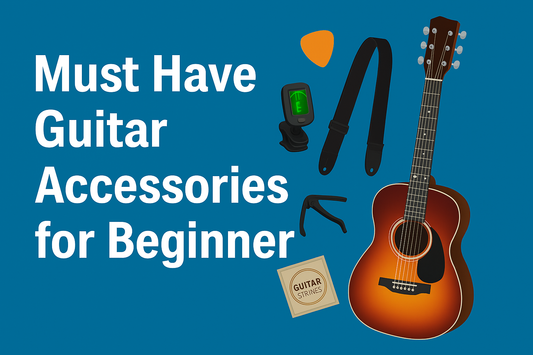Acoustic vs Electric Guitar for Beginners: Which is Better?

Starting your journey as a guitarist is exciting, but one big question always comes first: Should you learn on an acoustic guitar or an electric guitar? Both guitars have unique advantages, and the choice depends on your goals, music taste, and comfort level. Some people say you must begin with acoustic because it builds finger strength, while others argue electric is easier due to lighter strings and lower action.
In this blog, we’ll compare acoustic vs electric guitar for beginners, explain their pros and cons, and guide you in choosing the right one. By the end, you’ll know which guitar suits your learning style best.
Understanding Acoustic Guitar
An acoustic guitar produces sound naturally through its hollow wooden body. You don’t need an amplifier; the strings vibrate and create music directly.
Features of Acoustic Guitars:
Sound Quality: Warm, natural, and rich tones.
Build: Larger body, thicker strings.
Portability: Easy to carry, no need for extra gear.
Maintenance: Minimal compared to electric.
Acoustic guitars are often used in folk, country, pop, and unplugged performances. For beginners, they teach discipline in strumming and finger placement.
Understanding Electric Guitar
An electric guitar requires an amplifier to produce sound. It uses pickups to convert string vibrations into electrical signals, which then create amplified tones.
Features of Electric Guitars:
Sound Quality: Sharp, versatile, and powerful.
Build: Slimmer body, lighter strings, easier to press.
Customization: Tone can be shaped with effects and amps.
Music Style: Common in rock, blues, jazz, and metal.
Beginners often find electric guitars easier on the fingers, which helps them practice longer without discomfort.
Acoustic vs Electric Guitar for Beginners – Key Differences
Ease of Play
Acoustic: Thicker strings require more finger strength. May feel tough at first.
Electric: Thinner strings and lower action make it easier for beginners.
Sound Variety
Acoustic: Limited to natural tones, great for simple songs.
Electric: Offers endless sound variations with pedals and amps.
Cost Factor
Acoustic: Generally cheaper (no need for amps).
Electric: Requires additional gear like an amp, cables, and pedals.
Learning Curve
Acoustic: Builds strong technique and discipline.
Electric: Easier to learn chords and scales in the beginning.
Portability
Acoustic: Grab and play anywhere.
Electric: Needs amp and power, less travel-friendly.
Pros and Cons for Beginners
Acoustic Guitar Pros:
Affordable option.
No extra equipment required.
Builds strong hand muscles.
Portable and durable.
Acoustic Guitar Cons:
Harder on fingers.
Limited sound range.
Larger body may feel uncomfortable.
Electric Guitar Pros:
Easier to press strings.
Wide sound variety.
Slim and comfortable design.
Perfect for modern genres.
Electric Guitar Cons:
More expensive setup.
Requires amp and cables.
Less portable.
Which Guitar Should Beginners Choose?
Choose Acoustic if:
You love unplugged, natural sounds.
Your budget is limited.
You want to build finger strength.
You enjoy genres like pop, folk, or country.
Choose Electric if:
You want easier playability.
You love rock, blues, or metal.
You’re excited to experiment with effects.
You don’t mind investing in extra gear.
Tip: If possible, try both guitars at a music store before buying. Many beginners make better choices when they hold and play the instruments.
Expert Recommendation
Music teachers often suggest starting with an acoustic guitar for discipline, but in reality, the best guitar is the one that motivates you to play every day. If an electric guitar excites you more, it might help you stay consistent. Consistency matters more than the type of guitar.
Conclusion
When it comes to acoustic vs electric guitar for beginners, there is no single “best” choice. Both guitars can help you become a great musician. Acoustic teaches strength and discipline, while electric makes learning easier and more fun.
The right guitar is the one that keeps you motivated to practice daily. So ask yourself—what music inspires you most? Let your passion guide your decision, and you’ll enjoy the journey of learning guitar.

 +91-987-654-3210
+91-987-654-3210




